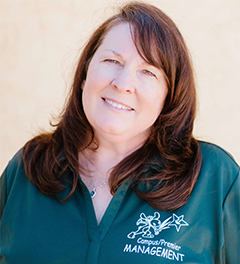Child Care Stabilization Grant Boosted Centers Through COVID-19 Onset, Aides Current Flourishment

Campus/Premier Executive Director Ronnie Armstrong
Established in July of 2021 by the DES Division of Child Care, the Child Care Stabilization Grant (CCSG) is a reliable funding source that is given directly to child care providers through federal child care relief funds to cover increased costs and challenges that occurred as a result of the COVID-19 pandemic. CCSG Child Care providers will receive funding until the expiration of the grant in June 2023.
Two child care providers which have found a critical lifeline in the CCSG funds are the Children’s Campus and Premier Children’s Center in Phoenix, both of which are operated by the same owner, Ronnie Armstrong, who credits the CCSG for the fact that they are still in operation today.
“We dove for [the CCSG] because we never had funding like that available to us–never, ever,” said Ronnie. “In all honesty, we would not be in business without the Stabilization Grant, because they pulled us out (assisted financially) when we needed it.”
When the CCSG was released, Ronnie and the centers’ ownership immediately applied for it. The quick reaction of deciding to apply for a grant such as this one is understandable, as child care centers were hit just as hard, if not more so than other businesses and industries during the pandemic.
“The whole world kind of shut down, so parents didn’t need child care, as they were working at home. People were afraid to bring children into group settings with the virus that was out there. At Premier, we went from serving 130 children per day, down to 35-40, if we were lucky,” said Ronnie.
When the CCSG was awarded to the two centers, the funding that was distributed on a monthly basis was split into two categories: bills for the facilities, and monthly bonuses provided directly to staff.
Thanks to the bonuses, teachers at the centers were able to alleviate some of their financial pressures, including reliable transportation and secure housing.
DES also issued increased reimbursement rates to eligible child care centers who support families served through DES child care assistance. With these supports, along with the CCSG, Ronnie was able to give her teachers raises as well.
“Probably one of the proudest days in my 35 years [working in early childhood] was that we got to announce to our teachers that they were getting a $2 per hour raise, which brought them to $17 per hour. People actually cried at the meeting. We had two teachers say they can quit their second job. The one that really touched me was a teacher who waited until everybody left the meeting that day and said that she is in an abusive relationship, and she felt like this raise might give her enough to support her and her son and she could get out of that relationship,” said Ronnie, holding back tears.
Working two jobs is commonplace in this industry that requires hard work and dedication, but with the new staff funding, providers say that it has eased some of the financial stress. What started out as a lifeline for them during the onset of the pandemic, the CCSG has now provided an opportunity for growth. Ronnie’s two centers now provide a new pay bracket that will offer even more income to teachers who have a degree or certificate.
With the attention of federal funding being so focused on the importance of child care, and many opportunities available from DES and partners like First Things First, Ronnie has a new sense of optimism for the industry and community she has been a part of for the past three-plus decades.
“I truly believe our early childhood providers are one of the key professions in our community,” she said. “This is the first time that I really have hope that people are seeing how important child care is to our economy.”
To learn more information about child care assistance and other services provided by DES, visit our website.

